Timeline of news
-
Februar 2025
Increasing practical skills among agricultural vocational students

The educational environment at vocational educational institutes has changed a lot during the past 30 years. There used to be educational farms at all agricultural vocational institutes in Finland. Students could get their first practical experience in a safe on-campus learning environment. Recently, many organizations got rid of their educational farms and started to carry out all practical training at private co-operational farms. Co-operational farms are not always located close to the campus, and it may be difficult to arrange transportation going there, at least it is time-consuming. As a result, the amount of time spent in practical training is decreasing. Teaching practical skills takes a lot of time. An authentic or close to authentic learning environment is to be preferred. A supervisor that stands next to the learner gives a feeling of safeness for the students. Vocational teachers are, besides skilled in a profession, also skilled in pedagogics. To avoid accidents, they have to be able to predict the movements of the students and different technologies. Often animals are also involved in practical farming training. Finland is undergoing a structural change in the agricultural sector, as one of the last countries in Western Europe. Farm enterprises have decreased in the last 20 years from 69.000 farms to less than 40.000. The trend is still ongoing. At the same time, the size of farm enterprises is growing. Some agricultural vocational schools have merged into larger units, others have closed. Some are changing into theoretical online education, whereas others are growing due to international study programs. Authentical environments are less used and more virtual environments and simulations. However, in the end, all these changes have resulted in a weakening of practical skills. As the rural population is decreasing overall, new arriving students do not have a background, either in farming, nor in living in rural areas. Skills and practices that 30 years ago were obvious among first year students must today be learnt at the training centers. The ProGreen project, Promoting and Upgrading Green Skills in Agriculture, kept its final seminar at Aukštaitija Vocational Training Center in south-eastern Lithuania 20–21.1.2025. At this vocational training center there is still an educational farm, as well as many other authentic educational environments on campus. Students learn the first steps in a safe vocational learning environment with a supervisor by their side. This is a prerequisite for developing personal vocational confidence and keeping up the high quality of vocational skills. ProGreen project uses the KAIN concept, Knowledge Acquisition according to Individual Needs. In this pedagogical approach, learning is happening at the farm enterprises – both the enterprise owner, the worker and the educational institution are actively supporting the learner. The further training needs can in this way be adjusted according to the employee’s personal skills, interests and present qualifications. The learning process includes classroom teaching and working with an own development project on-farm while working there. The supervisor is also visiting the learner on the working place. This will give a higher understanding on when, how and why work processes are carried out. At the end of the learning process there is a presentation of results, discussion about own learning and feedback in order to consolidate the learning.
-
January 2025
International Conference “Towards a Green Course in Vocational Education”
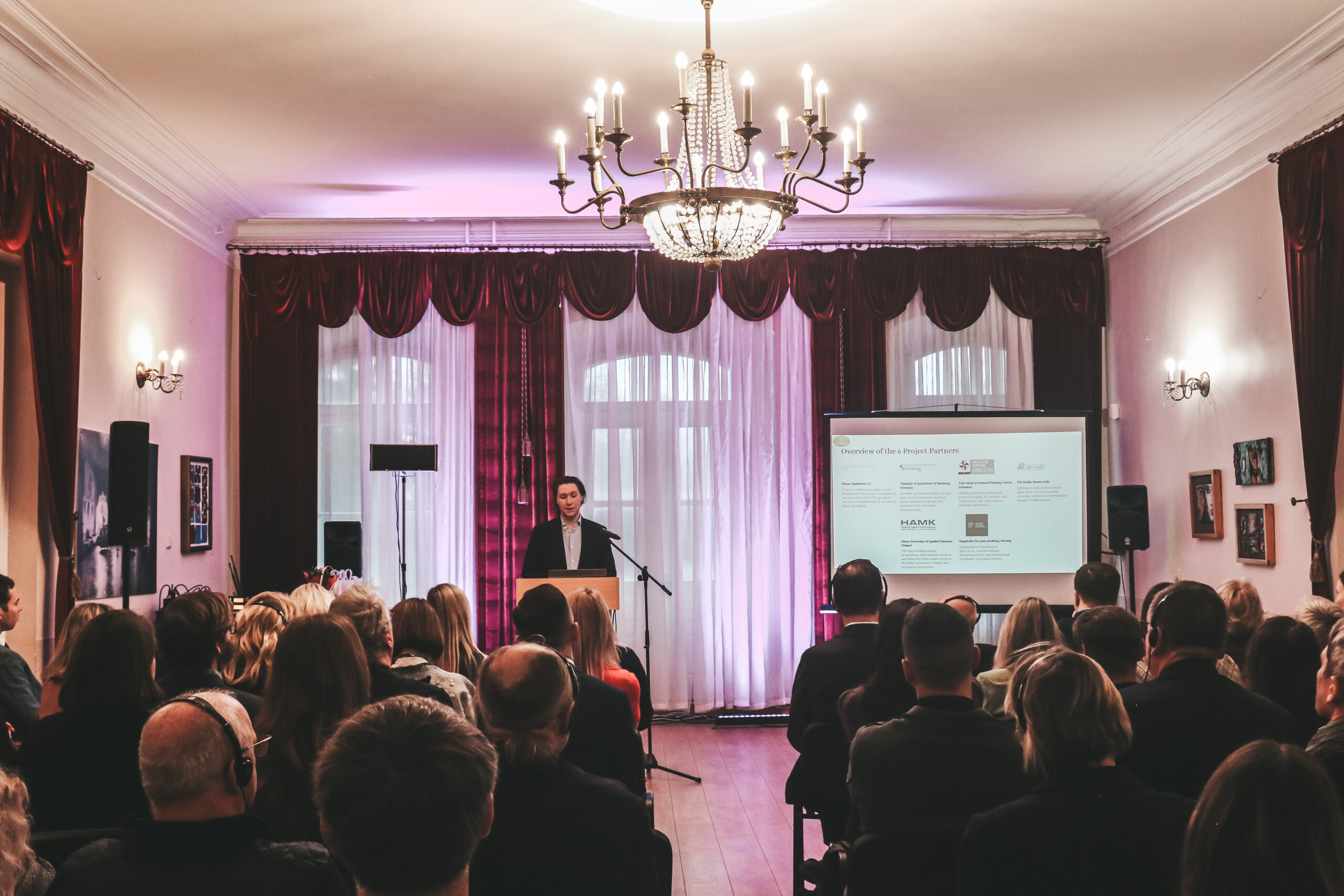
On January 21, 2025 our International Transfer Conference “ProGREEN — Towards a Green Course in Vocational Training” was organized by the Aukstaitija Vocational Training Center. The conference took place in Alanta Manor. Over 120 participants of the agricultural, business, political and vocational training community from all over Lithuania participated in the conference. Vladas Pusvaškis, Director of the Aukštaitija Vocational Training Center and Head of the Strategic Planning Department of the Ministry of Agriculture opened the conference. Everyone was also greeted and welcomed by adviser Goda Vainienė, head of the Vocational Training Department of the Ministry of Education, Science and Sports, specialist Vilma Matulionienė and the vice mayor of Molėtai district municipality Vaida Saugūnienė. The activities in line with the green deal and ProGREEN project participation of the Aukštaitija Vocational Training Center were presented by Vida Šeikienė, a methodologist at the vocational school. Hanse-Parlament project director Christian Wildt (Germany) presented the ProGreen project, it‘s aims and results. Other speeches during the conference came from the head of department specialist of Chamber of Agriculture of the Republic of Lithuania Irmina Kudarauskienė, director of Malnava College Sandra Ežmale and specialist Emilija Medne (Latvia), Häme College lecturer and ProGREEN project partner Annika Michelson (Finland), UAB Agrodronas director and VDU doctoral student Mindaugas Dorelis. During the discussions the results and impacts of the ProGREEN project were discussed among the participants. It was interesting and useful to share different ideas and best practices with colleagues, to listen to insights on the topic of the green deal and the ProGREEN project, and to establish new partnerships with colleagues from other countries in this international transfer conference.
-
Mai 2024
Developing Sustainable Farming by Cooperation Networks

Cooperation and networks brings new solutions and possibilities in farming. The location of a farm enterprise is of great importance. If a farm is close to a large city there are many possibilities in processing own raw materials and selling them to nearby markets. The ProGreen project, Promoting and Upgrading Green Skills in Agriculture, visited in May 2024 two very different farms located close to Hamburg city. Both are good example on sustainable farming close to a city environment. The first farm was a good example on how a city and a farmer can cooperate to a large extent. This cattle farm was using 200 ha land, out of which 190 ha was grasslands. On 10ha was grown corn. The farm owned only 20 ha of the land, the rest was rented from Hamburg city. The rent paid to the city was low, between 60–100 € per hectare. However, all land must be used extensively. There could not be used chemical pesticides or mineral fertilisers on the land. All fields had open drainage ditches and the city was pumping water into the ditches. In this way the field were used for cleaning the river water and turning it into drinking water. The farm was keeping 70 beef cows. The grazing pressure was 2 cows per hectare. The grass production was in 2023 ca. 9000–10.000 kg per hectare. Off-springs were slaugthered 9 months old. Own bulls were used for insemination. The cattle breed was mainly Siebenthaler. The slaughterhouse was located only 30 km from the farm and all meat came back to the farm when cut, it was cooled and packaged at the farm. The meat was sold directly off the farm and Instagram and Facebook were used in direct marketing to customers. The second farm was producing milk, which was processed it into yoghurts and different cheese. This farm also sells raw milk (no pasteurization). The farm is owned together by two neighbours. There are 220 ha of land, of which half is rented. Also, this farm rented land from Hamburg city. The farm have 150 milking cows and additional 30 young cattle. All fodder, mainly grass and corn, is produced at the farm. The average milk production is 9500 kg/cow. The farm employed 43 persons (2024), most in processing and logistics. Milk is packaged into recycled plastic bottles. Some of the plastic bottles are 25 years old. The farm distributes products directly to customers with 11 cars. 1400 customers subscribe milk products, which are delivered twice-weekly. Besides private customers, milk is also delivered to many restaurants and cafeterias. Farms with long transport distances to the market will have to develop other types of products.
-
May 2024
ProGREEN consortium meets in Hamburg: Progress in the education revolution for European agriculture

On the 23.Mai.2024, the ProGREEN consortium gathered in Hamburg for a pivotal transnational project meeting. We’re thrilled to share the advancements we’re making in our mission to revolutionize European agriculture through education. Our efforts have led to the development and implementation of several key training programs: Two initial vocational training programs for farmers to provide foundational skills. A training program for instructors to ensure effective teaching. A training program for educational staff to support comprehensive learning environments. Two advanced training programs focused on ecological agriculture and sustainable agricultural entrepreneurship to promote forward-thinking farming practices. Our goal is clear: equip farmers with the skills necessary to navigate the critical transformation in European agriculture. This includes reducing CO2 emissions, preserving biodiversity, and ensuring the careful use of soil, air, and water. These educational initiatives aim to meet the pressing demands from politicians, nature conservation groups, and citizen initiatives. Farmers today need to stay competitive, produce high-quality food, and fulfill important social roles such as promoting inclusion and strengthening local networks. However, there are significant challenges. According to the European Parliament, only 8.5% of farmers currently possess the necessary skills and qualifications. Moreover, the farming community is ageing, with just 11% under the age of 40 and a third over 65. This highlights the urgent need for educational programs like ours to rejuvenate and empower the agricultural sector. During our meeting, we had the privilege of visiting two exemplary farms in Hamburg. These farms are leading the way in species-appropriate animal husbandry, aligning ecology with economy, and showcasing innovative business models. Together, we are working towards a sustainable and prosperous future for European agriculture. With ProGREEN’s educational initiatives, we are confident that we can equip farmers with the skills needed to embrace these changes and ensure the sustainability of agriculture in Europe. This transformation is not just about meeting environmental goals but also about ensuring the economic viability and social responsibility of farming communities. Let’s continue to support and expand these efforts, working hand in hand for a greener, more sustainable future in agriculture.
-
June 2023
Transnational Project Meeting and Train-the-Trainer testing in Bryne, Norway
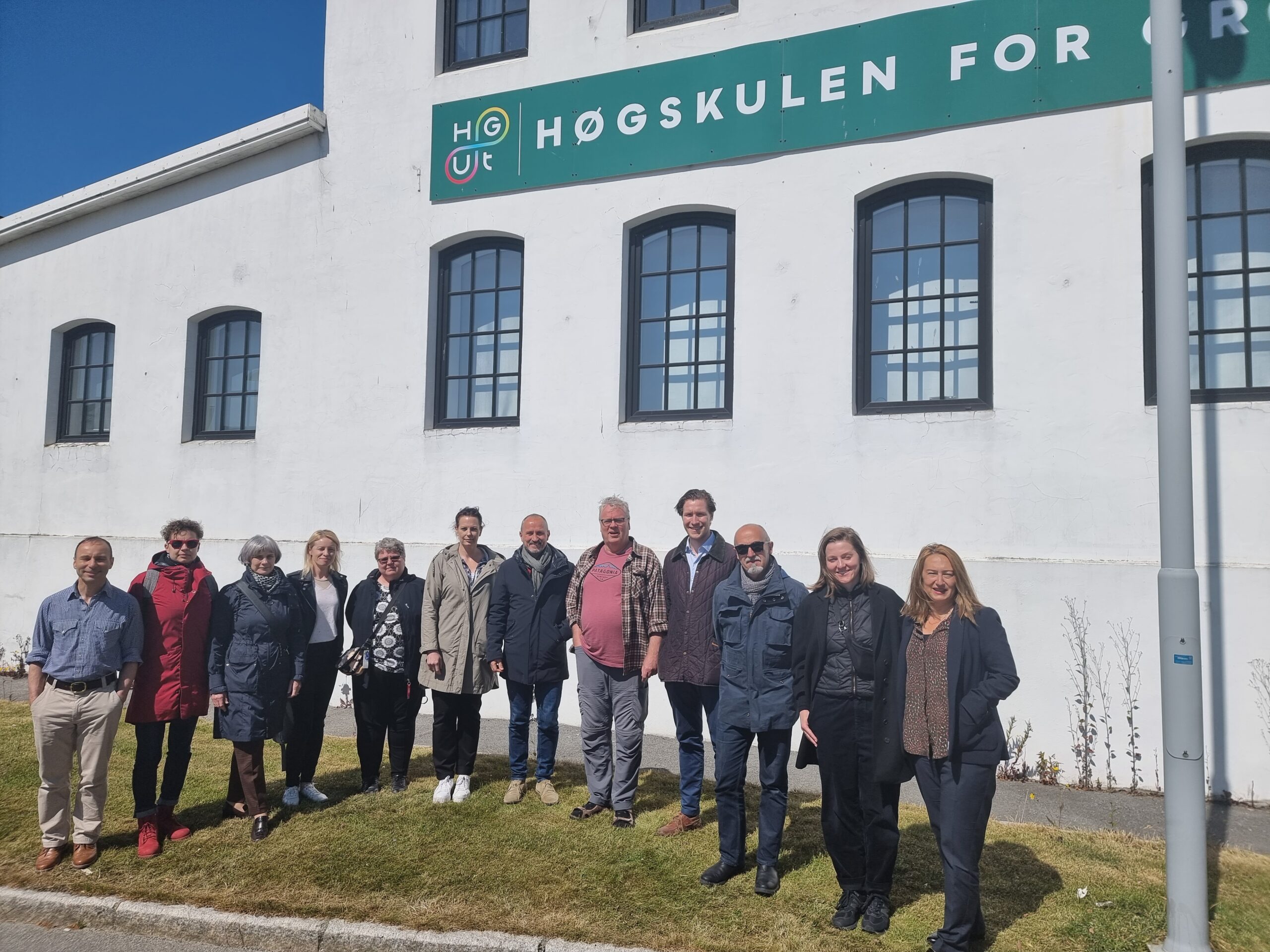
The ProGREEN project group met in the south-western corner of Norway at Høgskulen for grøn utvikling on Bryne in early June 2023 to continue development work and discussions on the needed changes in agricultural vocational education. Christian Wildt from the Hanse-Parlament in Hamburg, Germany, presented and led a discussion on new trends in agriculture. In the agricultural sector, agrophotovoltaic systems are emerging. This system involves installing solar panels above agricultural fields. You have the option to install them horizontally at a height of 5 meters above the fields or vertically across the fields. The vertical solar panels can produce energy on both the front and back sides of the panel, increasing energy production by 160–190%. You can space the vertical panels 8–10 meters apart and also use them as fences. The panels provide shade for both crops and animals during grazing, such as in chicken keeping. Tests of these systems have taken place in India, Italy, and Germany, among others. However, operating machinery between the solar panel structures can be challenging, and there may also be issues with agricultural support. Nadine Eckhoff from the Chamber of Agriculture in Hamburg points out that it is important not to fill up good agricultural land with solar panels, but to find a suitable balance in these new solutions. Another emerging trend is the use of carbon farming to trade humus certificates. Carbon farming is an agricultural practice aiming to sequester carbon dioxide from the atmosphere and store it in the soil. Humus certificates are a mechanism that incentives and rewards farmers for their effort in building soil carbon and sequestering carbon dioxide. Humus is the basis for soil fertility. According to the Thünen Institute, humus-forming measures such as additional cultivation of catch crops or the establishment of agroforestry systems in Germany could, in the best-case scenario, bind an additional five million metric tonnes of CO2 as soil carbon in the field each year. Farmers can increase the humus content in their soil by using CO2 certificates, also known as humus certificates, to reward humus enrichment. The farmer signs a contract with specialised certification companies for an agreed period of time (for example, 10 years). As a result, they commit themselves to increasing the humus content of their soil with regenerative measures. Regenerative methods include, for example, extending crop rotation, reducing tillage, growing catch or cover crops, and growing perennial crops like clover grass. At the end of the contract period, the companies measure and certify the actual CO2 sequestration implemented on the field, and subsequently pay the farm a premium for this service. Some certifiers use scientific studies to calculate carbon sequestration for specific measures rather than relying on measurements. This means that there is no additional cost for soil samples. The certifiers then resell the certificates for the respective CO2 sequestrations to companies that want to offset their own greenhouse gas emissions. The Humus certificates have also been subject to significant criticism. Since carbon sequestration is reversible, there is no long-term guarantee. For years, subsidy programs have financially supported certain humus buildup measures. Transporting plant mass from one area of the farm to another creates a shifting effect that contributes to humus buildup. One can also argue that this system lacks fairness, as many organic farms have already been building up humuse for decades. Annika Michelson, lecturer at HÄMe University of Applied Sciences
-
November 2022
Facing new challenges in the field of agricultural vocational education

Global agriculture is facing significant challenges. We expect farmers to generate sustainable incomes, enhance their competitiveness, produce high-quality food, and simultaneously assume important social functions like inclusion and local network development. In order to be able to adapt to climate change and halt loss of biodiversity, the agricultural sector seeks methods to transform into regenerative use of natural resources. How can we then develop vocational education to meet society’s needs? Istituto Tecnico Agrario Emilio Sereni is located near Rome, Italy. This vocational agricultural institute has a 35-hectare educational farm consisting of vineyards, olivegroves, orchards, arable land, artichoke fields, experimental fields, and greenhouses. There are also processing units for wine and oil. All productions are organic. The educational farm primarily produces wine, oil, honey, and ornamental plants, which the institute directly sells. Students at Istituto Tecnico Agrario Emilio Sereni in Rome present their educational institutions for guests. As part of their practical training, the school’s students work at the farm on a daily basis. They also participate in pruning, harvesting grapes and olives, growing ornamental plants, making wine, and collecting and processing honey. There are also experimental field trials of vegetable crops at the farm. Italian farms are relatively small, typically spanning about 6 ha in the central region of Italy. While the farms do not require farm workers, they are modernising the agricultural food sector by implementing new technological solutions and expanding their teaching methods to include marketing. In recent years, HAMK has integrated agricultural vocational education into our educational farm work, following the model of Istituto Tecnico Agrario Emilio Sereni. Agrario Emilio Sereni. To provide students with authentic tasks, real farm data is required. AConsequently, Mustiala has developed an open-access documentation of its educational and research farm activities and processes, available at www.mustialanluomutila.fi.This is significant because fewer students come from farming backgrounds, necessitating safe practice before granting them the freedom to participate independently in private farm activities. Modern greenhouses use hydroponic growing systems. One can carry out greenhouse cultivation either by using substrates and growing in pots or by solely using liquid medium. Substrates can be rockwool, perlite, pumice, or natural materials such as peat, pomace, or coconut fibers. Long drought periods in the Mediterranean area drive the development of microorganic irrigation systems, providing a more efficient way to use water resources. Italy cultivates tomatoes, peppers, cucumbers, gerberas, and roses using rowing systems. In the liquid growing system, plants are floating on a larger amount of water. This system is better for fast growing plants with large leaves, such as salats and spinach. Such systems can alsUrban areas can establish such systems, which require less land resources compared to traditional methods. l It may also be possible to grow medicinal plants in these modern environments. Alanta School of Technology and Business in south-eastern Lithuania is working on developing a new study program for practically gifted students and students with learning difficulties. Finding suitable farm practice places for practically gifted students and students with learning difficulties is a challenging task. For several years, the HAMK Mustiala educational and research farm has used drones to monitor fields. The educational farm at Alanta School of Technology and Business also mandates the use of drones for monitoring purposes. However, they both confront the same challenge: how can we utilise the drone data for farm management? At HAMK, biochar has been the focus of several projects. Nummilohko added biochar in 2020, but it will take some time to observe its effects. Alanta School of Technology and Business in Lithuania is also interested in biochar, and they participate in a new project on producing biochar out of princess trees (Paulownia tomentosa). In Germany, there is a need for educating farm workers at larger agricultural enterprises in using more green methods according to the European Green Deal and United Nations Sustainability Goals. For this purpose, we have developed two additional training courses: Sustainable Agricultural Entrepreneur is developed by Høgskulen for grøn udvikling in Norway and Modern Ecological Agriculture by Häme University of Applied Sciences. Annika Michelson, lecturer at HÄMe University of Applied Sciences
-
October 2022
Transnational Project Meeting at the Istituto Tecnico Agrario Emilio Sereni in Rome
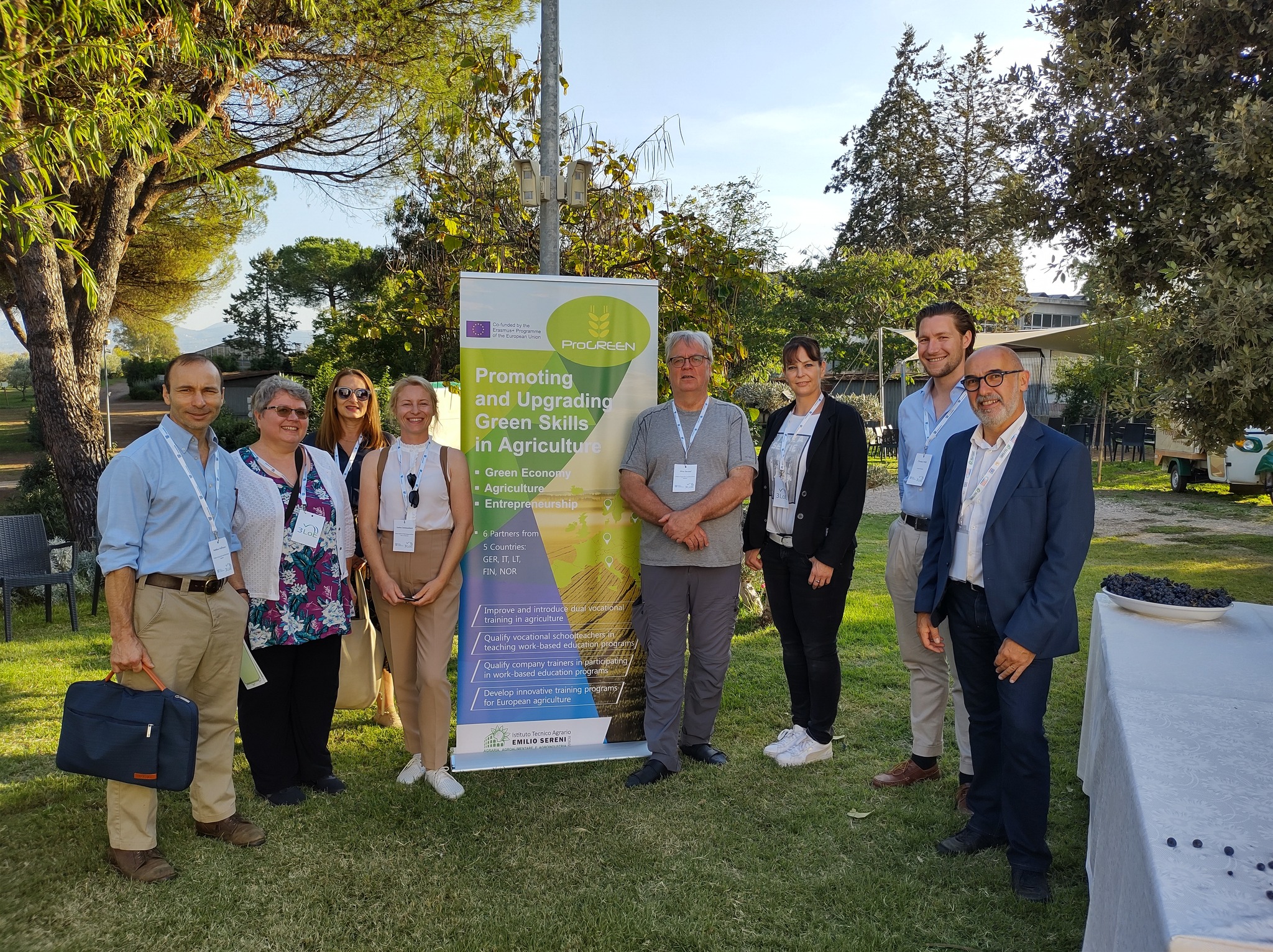
On October 2022, we had our second ProGREEN transnational project meeting at the Istituto Tecnico Agrario Emilio Sereni in Rome. After an interesting visit of the school’s experimental fields, we discussed the development of two initial vocational training programs, one company trainer program, one train the trainer program and two further training programs. All programs have the goal of helping farms to reach the Common agricultural policy targets (CAP) for the period 2023–2027, focusing on ecological farming to preserve our biodiversity, soil, water, air and to mitigate the effects of climate change.
-
June 2022
Transnational Project Meeting in Hamburg
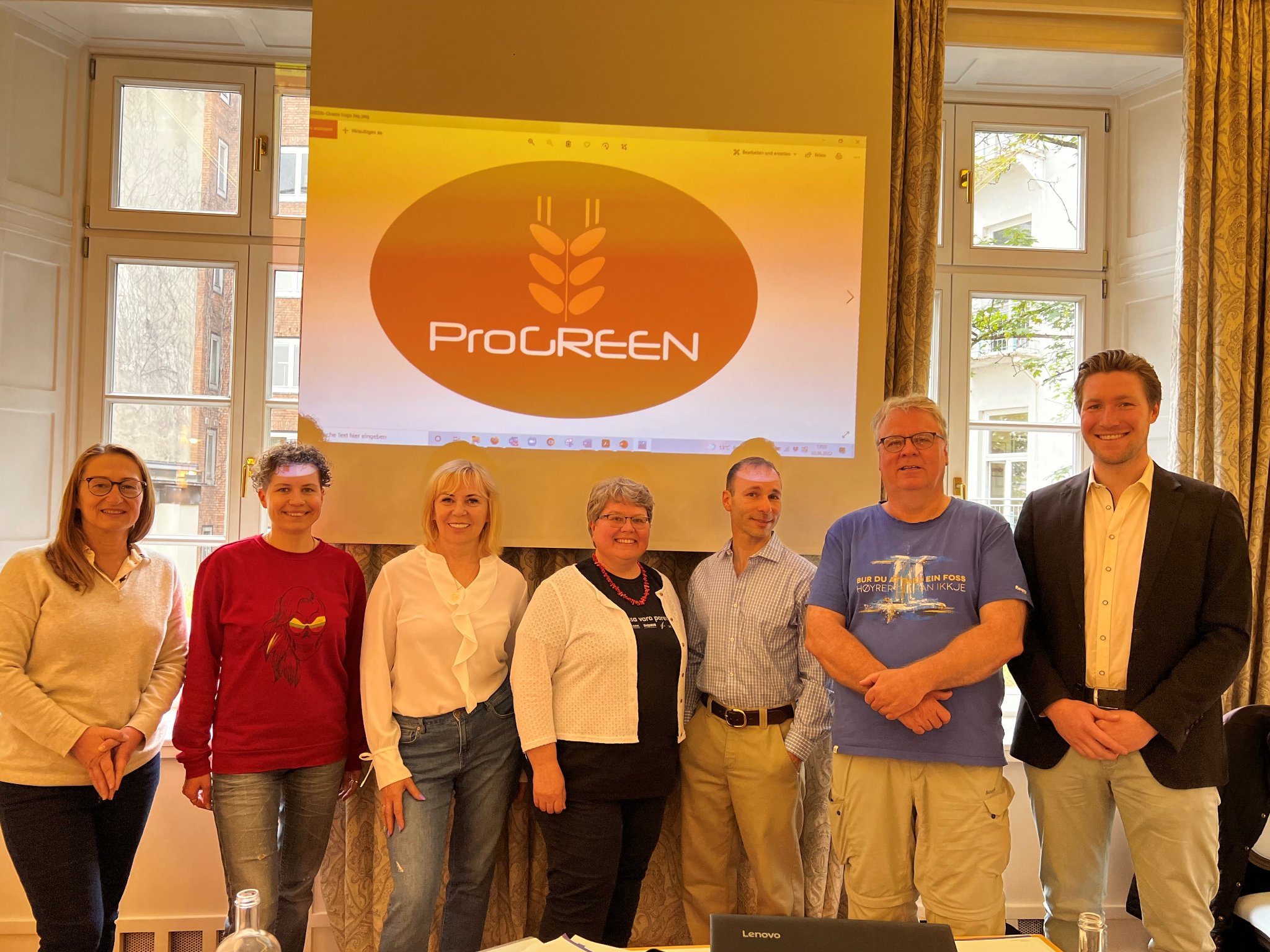
On June 2022, the ProGREEN project consortium met in Hamburg to discuss the upcoming educational product’s development work. Within the ProGREEN project, initial dual vocational education will be promoted, company trainers and school teachers will be trained to work in the dual vocational training system and two further educational programs will be designed according to the latest ecological standards, focusing providing guidance on holistic agriculture. The agricultural sector is decisive in conserving biodiversity, slowing down climate change and providing health food for all citizens. We aim at supporting the ongoing transformative processes by improving qualifications, knowledge and further education possibilities of farmers in the EU.
-
March 2022
New Project Start: ProGREEN
𝐍𝐞𝐰 𝐏𝐫𝐨𝐣𝐞𝐜𝐭 𝐀𝐥𝐞𝐫𝐭!! ProGREEN — Promoting and Upgrading Green Skills in Agriculture European agriculture is facing a significant transformation. Reduction of CO2 emissions, preservation of biodiversity, careful use of soil, air and water are just some demands made by politicians, nature conservation associations and citizens’ initiatives. At the same time, farmers are expected to generate sustainable incomes, increase their competitiveness, produce high-quality food and, to take on important social functions such as inclusion and the development of local networks. This means that the substantive ecological transformation must be accompanied by a personnel one. But there is a lack of important qualifications for this, as only 8.5% of farmers have a comprehensive education. Also, the current generation of European farmers is severely over-aged, with only 11% younger than 40 and a third over 65. The ProGREEN project will contribute to better agricultural qualifications with the development, testing and permanent implementation of a set of different educational products. Ecology through economy is the conviction that characterizes the consortium and this project. Ecological measures are only sustainable if they also make business sense for the individual farmer.

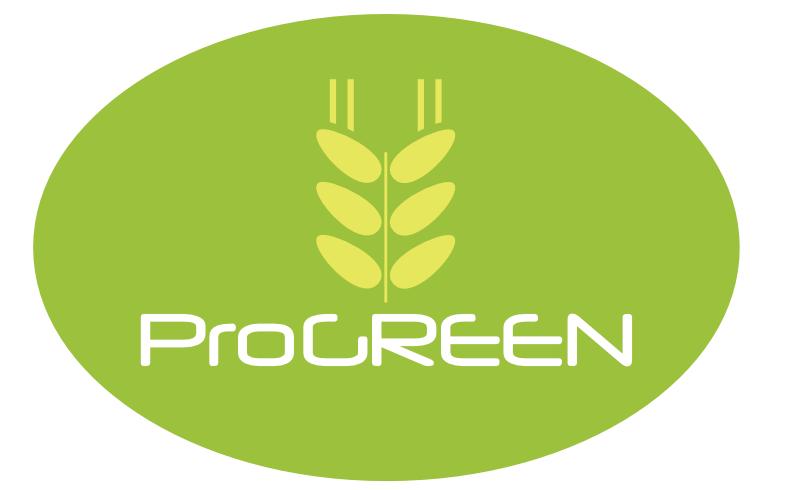
Funded by the European Union. Views and opinions expressed are however those of the author(s) only and do not necessarily reflect those of the European Union or the European Education and Culture Executive Agency (EACEA). Neither the European Union nor EACEA can be held responsible for them.

